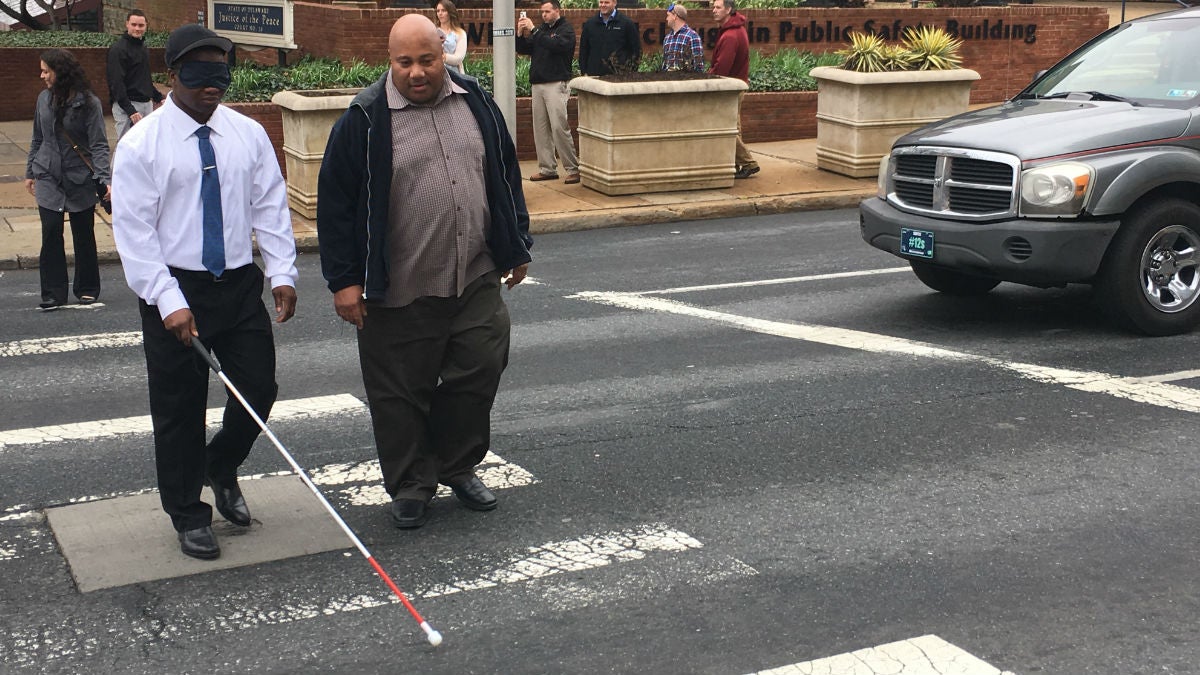A mother’s fear spurs training sessions for Wilmington PD [video]
Listen
Wilmington Police officers walk across Walnut St. using blindfolds to experience what life is like for those who are visually impaired. (Mark Eichmann/WHYY)
Wilmington Police learned a little of what it’s like to be visually impaired during a training session with the Delaware Division for the Visually Impaired.
The way police interact with the public has been a hot topic in recent years. Police-involved shootings are often rooted in misunderstandings. That problem gets worse if an officer isn’t aware that a person he’s talking to might have a disability.
For the mother of a teenager who is visually impaired, Yomayra Carmona worried that such a misunderstanding would end badly for her son Bryant. “You can’t tell he’s visually impaired, so my fear was … if he’s being approached by an officer, and he doesn’t respond how they expect him to, he could be hurt because he is being defiant to one that doesn’t know,” Carmona said.
She reached out with her concerns to the state Division for the Visually Impaired for help. As a result, Wilmington Police hosted DVI for four training sessions to help officers get a better understanding of what life is like for the visually impaired. Officers donned blindfolds and received assistance from colleagues as they crossed Walnut Street without being able to see.
For Bryant, it’s important for officers and others to understand his story. “I like to let people know how they can help me, or how I can let them know what to do when I need helping,” he said.
Helping to teach that lesson was Heather Dougherty with DVI. “If I were to approach Bryant from the side, he may not see me,” Dougherty told a classroom full of several dozens of officers. “He might respond a little bit differently than somebody else and that’s what could potentially cause a different reaction.”
Fellow teacher Maria Lepore-Stevens said officers should ask why someone may not be complying. “Let’s take a step back … do they have a visual impairment, do they have some sort of disability, do they have hearing loss? What is going on, maybe we should think about how we interact with people a little differently,” she said.
In addition to crossing the street blindfolded, officers also tried to do simple tasks like opening and pouring a drink without being able to see.
“Any key indicator that we can process from this learning training today, to have our first responding, our front line, our patrol division officers recognize a symbol of blindness or a symbol of some type of impairment, absolutely it’s a win for us,” Wilmington Police Sgt. Andrea Janvier said.
The training for officers is believed to be the first of its kind in Delaware. Other departments could soon see their officers walk in the shoes of someone who is visually impaired. “It’s really scary as a person with a visual impairment if you’re walking along and someone grabs you, or they grab your cane, or they touch your dog or they come into your vision when you didn’t know they were there at all,” Lepore-Stevens said.
For Bryant’s mother, training the police helps, but everyone can do their part to help those with disabilities. “Be kind to people. Be kind, and if someone does ask for help. Just help, just help out,” Carmona said.
WHYY is your source for fact-based, in-depth journalism and information. As a nonprofit organization, we rely on financial support from readers like you. Please give today.





